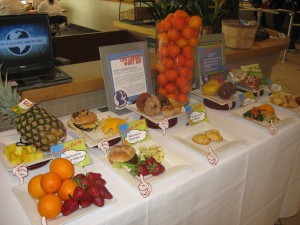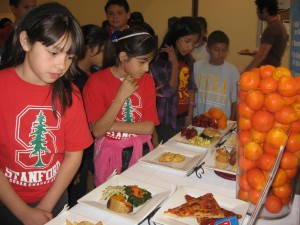Redlands Combines Technology and Fresh Produce to Educate Guests
- by Guest

A display table educates guests on which foods are low carbon and which contribute to climate change
by Susan Martinez, Operations Manager and Brett Martin, Resident District Manager
How do you get a plugged-in, tweeting, Facebooking generation interested and involved in sustainable farming? University of Redlands in Redlands, CA, found an answer this year for Low Carbon Diet Day– appeal to their inner techie.
On campus environmental clubs, Bon Appétit, and SURF (the Sustainable University of Redlands Farm) worked together to create a program that used both technology and just-harvested produce as teaching tools to illustrate the connection between food and climate change.
At the Irvine Commons Café, an educational booth staffed by members of the university’s Students for Environmental Actions (SEA) club featured laptops with live, interactive demos of the Low Carbon Diet Calculator, a tool designed to illustrate the carbon impacts of different foods. Throughout the lunch hours, the SEA staffers spoke with guests about the online tool, offered Low Carbon Diet tips, and handed out wallet cards to take home.
SURF contributed a fresh harvest of romaine lettuce, herbs, and chard to the event. These vegetables, with soil still clinging to their roots, served as a down-to-earth balance to the technology and a culinary reminder of low carbon eating in action. Chefs made a delicious entrée with the chard by wrapping it around heirloom shell beans and sweet corn and serving it with a sweet red pepper sauce, grilled zucchini, locally grown Maui-style onions, and roasted butternut squash.
The University of Redlands team also reached out to a younger student body, as 140 kindergarten through sixth-grade students from César Chávez Elementary School in Redlands, CA, visited the café. The youngsters, part of the ASES (After School Education and Safety) program, received a special tutorial from Director of Operations Kim Blum, who explained how food choices contribute to global greenhouse emissions. After the lesson, the children filled their lunch trays with carbon-friendly choices, glad to be part of the climate solution.
